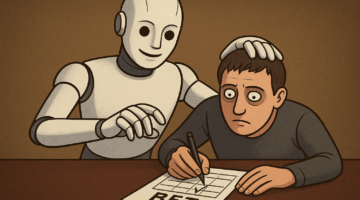Why Do Some Win While Others Lose?

The world of betting is a fine line between success and failure. Some turn gambling into a source of income by using analytics and a strategic approach. Others lose everything by relying on luck and emotions. This article will explore two contrasting fates: Haralabos Voulgaris, who made millions from sports betting, and Noah Vineberg, whose life collapsed due to gambling addiction. We will examine the key factors that determine who wins and who ends up in a financial pit.
How Haralabos “Bob” Voulgaris became a millionaire through betting
Haralabos Voulgaris grew up in Winnipeg in a family of Greek immigrants. His father often took him to the racetrack, where the boy got his first exposure to the world of betting. While Bob’s father was superstitious and frequently lost, Bob realized early on that gambling could be more than just a game of chance – it could be a source of income if approached wisely.
As a teenager, Bob earned $7,000 from a summer job but quickly lost it all on horse racing. This became a valuable lesson for him: he decided never to gamble blindly again and instead focus on an analytical approach.
During a trip to Las Vegas, Bob became interested in basketball and started betting on totals. He noticed that carefully studying team statistics and tactics could provide an advantage. For example, he began betting on first-half totals, which became his first successful strategy.

In 2000, Bob placed a $50,000 bet on the Lakers winning the NBA championship at odds of 6.5. This wager earned him $325,000 and marked the beginning of his professional career. By the way, in this article, we have highlighted the key betting events of the year.
Bob dropped out of school, moved to Montreal, and started investing in an offshore sportsbook. He assembled a team of professionals and developed a betting analysis bot. They employed complex strategies, including the manipulation of odds, to maximize their advantage. For instance, they placed fake wagers to shift the odds in their favour. Over the years, their ROI (return on investment) ranged between 7-9%, an incredibly high figure in the betting industry.
With the rise of cryptocurrencies, Bob shifted his focus to Bitcoin investments, realizing that the earning potential in crypto was far greater than in betting. Over his career, he earned approximately $120 million but decided it was time for new challenges.
Bob’s story is an example of how betting can become a profession if approached with intelligence and discipline. However, his experience also highlights that success requires not only knowledge but also a willingness to take risks and the ability to recognize new opportunities at the right time.
How gambling destroyed Noah Vineberg’s life
Noah grew up in the suburbs of Ottawa in a family where his father lived a lavish lifestyle – luxury cars, expensive suits, yacht parties. However, behind this glamorous facade were infidelity and deceit. Noah’s father often took him along on meetings with girlfriends, forcing him to keep secrets from his mother. In return, Noah received money and gifts, shaping a distorted perception of wealth and relationships.
From an early age, Noah was passionate about sports. In third grade, he started organizing fantasy hockey leagues among his classmates – his first experience with gambling. After his parents’ divorce, Noah began skipping school to place bets on sports events using Pro-Line lottery tickets. He spent up to $150 a day, using money earned from part-time jobs. By the age of 19, Noah was already a compulsive gambler. He got married, worked two jobs, but continued to spend most of his earnings on betting. In 1999, he declared bankruptcy, owing $60,000. His marriage fell apart, and he found himself in deep financial trouble.
In 2002, Noah started working as a bus driver and built a new family. However, his gambling addiction didn’t go away. He took out loans, played online poker, and kept losing money. By the age of 35, he had lost over $500,000 throughout his life. His relationships with his family deteriorated, and he began missing mortgage payments.
In 2005, Noah first sought help from Gamblers Anonymous but failed to quit betting completely. By 2010, he was once again placing wagers through online platforms, hiding it from his wife. By 2018, his debts had reached $75,000, and he was on the verge of losing his family. After a major argument with his wife, Noah enrolled in a three-week addiction treatment program. There, he realized that his gambling problem stemmed from feelings of abandonment caused by his father. Since then, he has stopped gambling and has been working on being more responsible in his relationships.
Noah’s case serves as a warning about how betting can ruin lives. His experience shows that even after years of struggling with addiction, recovery is possible if one seeks help and acknowledges their mistakes. Read this article if you are concerned about gambling addiction.
Why does betting make some rich and others broke?
Success in sports betting is not about luck – it’s about the right approach. Accomplished gamblers view betting as an investment. They develop strategies, study statistics, and make decisions based on analysis. For example, Bob Voulgaris used mathematical models and automated systems, which gave him an edge over bookmakers. In contrast, unsuccessful gamblers rely on luck, emotions, and random guesses. Noah placed wagers without a strategy, hoping for a big win, but the lack of a system led him to bankruptcy.

Discipline and financial management are also crucial. Professional players strictly control their bankroll – the amount they are willing to risk. They never bet more than they can afford to lose and adhere to pre-set limits. Bob, for instance, always capped his wagers to avoid large losses. Meanwhile, Noah spent all his money and then borrowed more, leading to financial collapse.
Emotional control separates professionals from compulsive gamblers. Successful bettors don’t let emotions dictate their decisions, even during losing streaks. They remain calm and stick to their strategy. Bob never tried to win back, whereas Noah placed wagers in a state of stress, which only worsened his situation. When excitement takes over reason, the chances of success drop to zero.
Another critical factor is learning and analysis. Professionals constantly study new methods and refine their strategies. Bob didn’t just watch games; he analyzed statistics, modelled probabilities, and developed software tools. In contrast, Noah placed bets based on intuition and personal preferences, dooming himself to losses.
Environment and support also play a significant role. Bob worked with analysts, mathematicians, and other professionals, which helped him succeed. Meanwhile, Noah hid his problems from his family, leading to isolation, depression, and worsening financial conditions. People who struggle with gambling addiction alone rarely find a way out of their crisis.
Thus, the difference between winners and losers lies in discipline, analytical thinking, and emotional control. Betting can be a source of income, but only if approached responsibly. Otherwise, it becomes a path to financial trouble and personal disaster.
Relevant news

How Technology Is Transforming Online Sports Betting in Canada
Just ten years ago, placing a bet on a match meant visiting a sportsbook website,…

Why Canadian Bettors Prefer Bet365 and Other Key Habits
Ahead of one of the most event-packed sports years – with the Winter Olympic Games,…

The Canadian Bettor’s Calendar for 2026
2026 is set to be a busy year for sports betting fans. The main feature…

Online Betting in Canada: When Convenience Turns Into a Problem
Online betting has become firmly embedded in the habits of Canadian players. There is no…

Why Canadian Youth Are Vulnerable to Problem Sports Betting
With the introduction of a regulated gambling market, sports betting has rapidly expanded across Canada.…

How AI Pushes Canadians Toward Betting
A major global trend of recent years is the growing popularity of AI-powered chatbots. Millions…
